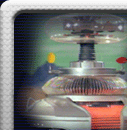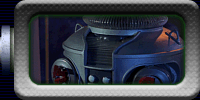




 |
|
| Home->Robot History | |||
By
Bruce Moffatt The Robot: also referred to as Model B9 (This term was used in the second season episode The Ghost Planet or less well known as class M3 (Used in the second season episode The Colonists). Whatever you want to call him, this is a science fiction figure that has been indelibly burned into the minds of many people over the years.
I would like to share some information with you on the origins of the Robot and the team of talent that came together to breath life into him. When the decision was made to add an additional crewmember to the Jupiter 2 contingent, the right person would have to be found to fill the environmental control robot's treads. Bob May had worked with Irwin Allen previously on "Voyage to the Bottom of the Sea" in a couple of bit parts. While being interviewed for a part as a stunt double for Red Buttons for the remake of Stagecoach at 20th Century Fox Studios, Bob received a call from one of the casting staff at the studio. He informed Bob that Mr. Allen was putting together a series and felt there was a part in it for him. Bob May met with Irwin Allen who informed him that the Pilot for Lost in Space was sold, but they needed to add a couple of characters to the show. Irwin asked, Would you be interested in playing a Robot?, Bob's reply was in the affirmative (pardon the pun) Irwin said "Fine. If you can fit into the suit we have partially made, you can have the job." What was made of the suit at the time fit, and science fiction history was on the way to being made. By the time Bob May was hired, Art Director Robert Kinoshita (the designer of Robby the Robot) had already completed the designs for the Robot. Some measurements were taken from Bob, to assure the finished suit would fit comfortably. Once inside the suit, Bob would see out through the slatted collar with the upper half of his face blackened to avoid showing up on camera. As work neared completion on the costume and at a suggestion from Bob, the neck assembly was given up/down movement to give the Robot an extended range of expression. The Fox special effects team voiced concern over the bubble Kinoshita had envisioned for the Robot's head. They felt the shape was to complex to produce. Kinoshita had worked in a ceramics factory after World War 2 and that experience would pay off here. A large plastic bubble was blown, and while still hot was squeezed into the shape he wanted. Bob May would be the voice of the Robot on stage, speaking the lines and pressing a small telegraph switch inside the Robot's left claw in sync with the syllables to activate the neon in the chest plate. A slight twitch can be seen in the left arm from time to time in the early episodes of the series. As Bob grew accustomed to the exercise, he became more adept and the Robot's nervous tick all but disappeared. The
television voice of the Robot was to be provided by Dick Tufeld,
already employed as the show's announcer. Dick had worked with Irwin
previously (also on Voyage) and after a call from his agent, went
to the Fox dubbing stage to read for Irwin. Dick presumed the voice
that was required would have a stiff, robotian kind of sound.
Irwin objected, saying he was looking for a cultured, laid back
voice. After twenty minutes, Irwin, thanked Dick and said that it was just not working for him. As he turned to leave, Dick asked him if could try one more thing. Dick delivered a series of robotian mechanical lines as he had originally intended. Irwin looked stunned and said, That's it! What took you so long? Dick was never on the set for filming of the episodes. During post-production, he would come into the studio and loop the robots voice, using recordings of Bob's lines delivered on the set played through headphones to synchronize with the original soundtrack. The sound engineers would then work to mix Dick's voice into the show. Depending on the number of lines to be recorded, and the Robot often had more lines than the principal actors, it could take one and a half to two hours to lay down 60 to 70 lines of dialogue for one episode. Both Dick Tufeld and Bob May have reprised their roles on a number of occasions, most recently in the Television documentary Lost in Space Forever. Dick also provided the voice for the much-reworked Robot in the Lost in Space movie (1998). The original Robot costumes have undergone much reworking over the years and changed hands several times. The Hero costume has recently been sold by Kevin Burns, who owned the costume during the filming of LIS Forever and an earlier documentary The Fantasy Worlds of Irwin Allen. As we move into the Millennium, I am looking forward to forging ahead with my own B9 and sharing my experiences with the group as others have done. Even though I am situated on the other side of the world I have enjoyed my interaction with other club members by e-mail. Come and join the fun! Cheers!
|
|||








 Robot
History
Robot
History  I
couldn't begin to explain why this intense fascination with a television
prop exists (and I don't think you would want me to try) but we
are all here because we share some of that same feeling. I personally
have fond memories of watching Lost in Space as a child, and I now
have the opportunity to share that with my children. (My son Stuart
is a budding club member who now sits with Dad and watches our hero
in action on video!)
I
couldn't begin to explain why this intense fascination with a television
prop exists (and I don't think you would want me to try) but we
are all here because we share some of that same feeling. I personally
have fond memories of watching Lost in Space as a child, and I now
have the opportunity to share that with my children. (My son Stuart
is a budding club member who now sits with Dad and watches our hero
in action on video!) 